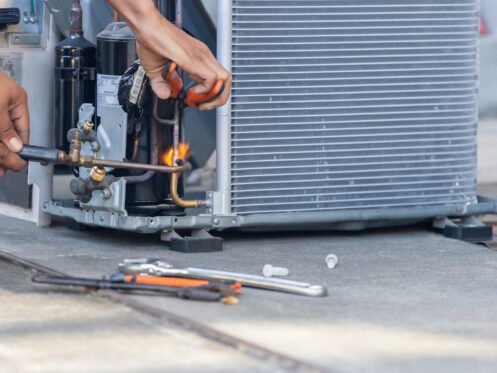One common problem homeowners experience during the summertime is their AC units freezing up. A few different things could cause your AC to freeze up. Understanding why this happens will help you get to the root cause behind a frozen unit so you can defrost it and get back to cooling your home.
What Does a Frozen AC Unit Mean?
HVAC technicians commonly refer to a particular AC issue as a “frozen” unit. But, what exactly does that mean? The frozen part refers directly to your system’s evaporator coil. The entire surface of the evaporator coil inside your indoor air handler unit will be covered in ice.
In a well-functioning HVAC system, the evaporator coil removes heat and excess humidity from the air. Inside the coil is a low-pressure refrigerant. As the blower fan forces hot air from your home over the evaporator coil, heat naturally travels from the high-pressure air to the low-pressure refrigerant. During this process, water droplets form on the surface of the coil.
Normally, these droplets fall into the drain pan and are directed outside your home. However, when the refrigerant cannot absorb heat as expected, it becomes frigid. This cold refrigerant will cause the water droplets on the evaporator coil to freeze. Eventually, ice will build up on the surface of the coil until it’s no longer able to function appropriately, and your AC will “freeze up” and stop working entirely.
Inadequate Airflow
Inadequate airflow is one of the most common issues that result in a frozen evaporator coil. When insufficient airflow moves through your system, the refrigerant cannot absorb heat properly. This will cause the refrigerant to get too cold and your coils to freeze.
Several culprits can be behind inadequate airflow, including dirty air filters. An HVAC filter is designed to trap airborne particles, like dust and pollen. Over time, HVAC filters become filled with debris and dirt, which restricts the air flowing through them, and the dirty air filter becomes clogged and unable to pass much air through. As the airflow slows, less air is delivered to the evaporator coil for the system’s refrigerant to cool, and the risk of freezing increases. Cleaning or replacing your HVAC filter is a fast, easy way to keep your HVAC system at its best.
Another common culprit in insufficient airflow in the system can be found in your ductwork. A network of ducts can be found within the hidden parts of your home and serves to move conditioned air to every room and space. Ducts are efficient when they’re in good shape, but they can develop leaks and gaps over time, allowing air to escape. If conditioned air escapes, this forces your HVAC system to work harder to maintain the proper temperature in your home. If air escapes from the return duct and into the wall and floor cavities, it will never make it to the evaporator coil and never reach the refrigerant. The heat will remain in the air and thus in your home. Even if your ductwork is intact, it could still be the underlying issue if it has a blockage, such as a nest from an infestation. Ductwork should be cleaned and checked periodically.
Low Refrigerant Level
Your evaporator coil has a complex design that needs just the right mix of refrigerant and airflow to maintain the appropriate coil temperature. Unfortunately, if your refrigerant level gets too low, this sensitive pressure can be limited. When the pressure in your evaporator coil gets too low, the coil won’t be able to stay warm enough to prevent freezing.
Low refrigerant levels are the result of a leak somewhere in your system. A professional will need to evaluate the source of the leak and repair it. Plus, they’ll need to recharge the refrigerant level inside your system to ensure it’s at an adequate level.
Faulty Blower Fan
Another culprit behind why you may have frozen evaporator coils is a faulty blower fan. The blower fan is responsible for moving expended hot air from your home to your HVAC system. When this fan malfunctions, there’s not going to be enough hot air reaching the evaporator coil. Without adequate heat, the coil will freeze due to the increasingly lower pressure of your system’s refrigerant.
A faulty blower fan can be the result of many different problems. In most cases, the fan belt may simply have worn out and broken off. Other causes include a faulty blower motor, a malfunctioning limit switch, and so many more.
Clogged Condensate Line
As your air conditioning system runs, it will remove excess humidity from the air. Typically, this moisture falls off the evaporator coil and into the drain pain, where it flows through the drain line to an area typically outside of your home. However, if there’s a clog somewhere present in your condensate line, then water isn’t going to be able to drain. It will simply back up into the drain pan and eventually overflow the evaporator coil. If the coil is too cold, it can cause the water around it to instantly freeze up.
Dirty Coil
One other culprit behind why your evaporator coil may be freezing up is that your coil’s surface is overly dirty. When too much grime and debris gets stuck on the surface of the evaporator coil, it will prevent heat from being absorbed by the refrigerant. This will cause the refrigerant’s pressure to plummet and your coil to freeze.
How Does a Frozen AC Coil Affect Your Unit’s Performance?
A frozen evaporator coil will affect your air conditioning system’s performance in many ways. First, ice will greatly limit your cooling system’s ability to adequately cool your home. You may even notice that the air coming out of your vents seems to be warm instead of cool.
This can cause your air conditioning system to continually run because your thermostat isn’t reaching your set temperature. This will quickly drive up your electricity costs. Unfortunately, if you let your AC system run with a frozen coil for an extended time, it can damage various system components, including the compressor and electrical system.
How to Thaw Out Your Frozen Evaporator Coil
There are multiple ways to thaw out your frozen evaporator coil. One of the most effective is to turn your blower fan to its “on” position without selecting “cool.” This will allow the fan to move hot air from your home over the coil until the ice eventually thaws out. This method can take a couple of hours but is fairly straightforward. As you do this, monitor your progress so the condensate pan doesn’t overfill with water and spill over onto your floor.
Once the coil is completely thawed out, identify what the root cause of the frozen coil was. For example, if the coil is dirty, it’s going to need to be cleaned to prevent it from freezing back up again. Do not simply turn your AC system back on without addressing the underlying issues as it will likely freeze back up again. You can help prevent some of these issues by regularly checking your HVAC filter, having your coils cleaned by a professional, getting your ductwork cleaned and sealed regularly, and getting your system spring maintenance service. Check out our maintenance club for exclusive discounts!
Reliable AC Repair Service
Landen Heating and Cooling offers reliable AC repair service for the whole Zebulon, NC community. Our technicians offer heating, cooling, indoor air quality, and ductwork services. Simply call our office today to book a service consultation with one of our technicians.


